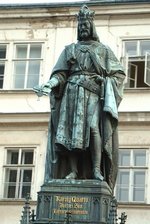Charles IV, Holy Roman Emperor
|
|
Charles IV (May 14, 1316 – 29 November, 1378), of the House of Luxembourg, King of the Romans (as Charles (Karl) IV, 1368 – 1378), Holy Roman Emperor (Charles IV, 1355 – 1378), King of Bohemia (Charles (Karel) I 1346 – 1378), Count of Luxemburg (1346 – 1353), Margrave of Brandenburg (1373 – 1378). He was born as Wenceslaus, later changed his name to Charles at his confirmation. From 1333 he started to administer his father's Crown lands due to the King's often absence and in 1334 he became Margrave of Moravia. He was elected as a rival King of the Romans to Emperor Louis IV, succeeded his father John of Luxemburg as King of Bohemia and Count of Luxembourg in 1346 as his mother was Elizabeth (Eliška), heiress of Bohemia, daughter of King Wenceslaus II and sister of King Wenceslaus III of the Premyslid dynasty. Charles was crowned as emperor of the Holy Roman Empire in 1355. After 1349, Charles IV was uncontested ruler of the Holy Roman Empire till his death in 1378.
During his reign imperial policy refocused on the dynastic sphere and abandoned the ideal of the Holy Roman Empire as a universal monarchy. In 1353 Luxembourg was granted to his brother Jobst. Charles IV concentrated his energies chiefly on the economic and intellectual development of Bohemia, founding the Charles University of Prague in 1348 and encouraging the early humanists — he is known to have corresponded with Petrarch, whom he invited to visit his residential Prague. Petrarch, however hoped (to no avail) to make Charles move his residence to Rome, to take up the tradition of the ancient Roman Empire. As he became fond of Prague, art and architecture flourished in his capital, owing to his activity as a builder and patron; construction of the Charles Bridge and of the Hradčany, completion of Saint Vitus Cathedral by Peter Parler are among the best examples. From the reign of Charles IV dates the first flowering of manuscript painting in Prague. In 1356 he issued the Golden Bull, which codified the procedures for imperial elections, but had the disastrous effect of causing minor princes who were left out of the electoral process to lose allegiance to the empire. In 1373 he inherited the Margravate of Brandenburg.
His French education left a lasting mark on Charles. His father, known as John the Blind, king of Bohemia, was an ardent francophile and patron of the composer and poet Guillaume de Machaut — he died at Crécy in 1346 while fighting on the French side. Charles's sister Bona, married the eldest son of Philip VI of France, the future John II of France, in 1335. Thus, Emperor Charles IV of Luxembourg was the maternal uncle of King Charles V of France, who solicited his relative's advice at Metz in 1356 during the Parisian Revolt. This family connection was celebrated publicly when Charles IV made a solemn visit to his nephew in 1378, just months before his death. A detailed account of the occasion, enriched by many splendid miniatures, can be found in Charles V's copy of the Grandes Chroniques de France.
Interview_of_King_Charles_V_with_the_Emperor_Charles_IV_in_Paris_in_1378_Fac_simile_of_a_Miniature_in_the_Description_of_this_Interview_Manuscript_of_the_Fifteenth_Century_in_the_Library_of_the_Arsenal_of_Paris.png
The Emperor was fluent in five languages - Latin, Czech, German, French and Italian.
Charles married four times. His first wife was Blanche, 1316–1348), daughter of Charles, Count of Valois, a half-sister of Philip IV of France. They had two daughters, Margaret (1335-1349), who married Louis I of Hungary; and Katharina (1342-1395), who married Rudolf IV of Austria and Otto V of Bavaria, Elector of Brandenburg.
He secondly married Anne (Anna), 1329–1353), daughter of the Elector Palatine Rudolph II, but they had no children.
His third wife was Anne of Swidnica, 1339–1362), by whom he had a son Wenceslaus (1361–1419), Charles's successor as Emperor and king of Bohemia.
His fourth wife was Elizabeth of Pomerania, 1345 or 1347–1393). They had four children:
- Anne of Bohemia (1366–1394), who married Richard II of England
- Sigismund (1368–1437), emperor, king of Hungary and Bohemia and margrave of Brandenburg.
- John, Duke of Görlitz (1370–1396)
- Margaret (1373–1410), who married John III, Burgrave of Nuremberg
In the present Czech Republic, he is still regarded as 'Father of the Country'.
| Preceded by: Louis IV | King of the Romans Also Holy Roman Emperor | Succeeded by: Wenceslaus |
| Preceded by: John of Luxemburg | King of Bohemia | Succeeded by: Wenceslaus IV |
da:Karl 4. de:Karl IV. (HRR) eo:Karolo la 4-a de Luksemburgio ja:カール4世 (神聖ローマ皇帝) pl:Karol IV Luksemburski ru:Карл IV sv:Karl IV, tysk-romersk kejsare

